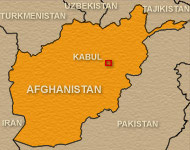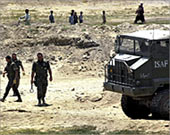Kabul peacekeepers wounded
Three Dutch peacekeepers were wounded in Afghanistan on Friday when their vehicle was hit by an explosion while on patrol in the north of the capital, Kabul.
 |
| Dutch troops were patrolling in the northern part of Kabul |
A military spokesperson for the International Security Assistance Force (ISAF) said all three were in stable condition, but the most seriously injured man would be sent back to Europe for medical treatment.
The cause of the blast, while the men were on patrol in the Shomali plain on the northern outskirts of Kabul, is still unknown.
In recent months, there have been several incidents of attacks on ISAF troops.
Most recently, four German peacekeepers were killed and 31 wounded in a suicide car-bomb attack in Kabul on 7 June.
The 5,000-strong ISAF, drawn from 29 countries, is under German-Dutch command until August when NATO takes over.
The force is confined to Kabul as Western governments including the United States and Britain have declined repeated requests from the Afghan government and aid agencies for the force to be expanded to other cities.
There are also about 11,500 US-led troops in Afghanistan searching for remnants of the Taliban and their al-Qaeda group allies.
In other developments:
The Afghan government said on Thursday it had worked out a plan with warring factions to demilitarise the volatile city of Mazar-esharif where British forces were being sent to help the government tackle lawlessness.
Interior Minister Ali Ahmad Jalali said the rival factions of ethnic Uzbek commander General Abdul Rashid Dostum and ethnic Tajik commander Ustad Atta Mohammad, had supported the plan to withdraw their forces out of the northern city.
Fighters from the rival factions, both of whose leaders are members of the transitional government, have clashed repeatedly in Mazar and surrounding areas since the Taliban was ousted in late 2001.
 |
| ISAF peacekeepers continue to be targets of attack |
The clashes in the north, and similar clashes elsewhere in Afghanistan, have disrupted operations by aid groups and thrown into question the ability of President Hamid Karzai’s government to impose its authority.
Jalali, who this week travelled to the north to meet faction commanders, said he had been assured of their cooperation but he appeared cautious about the prospects for the latest in several similar attempts to defuse tension in the region.
“Apparently, the situation in Mazar seems good,” Jalali told a news conference. “But in reality it can change any moment,” he said.
Britain said last week it would send what is known as a provincial reconstruction team of about 50 troops and civilian staff to Mazar this month.
British Defence Secretary Geoff Hoon said the troops would focus on improving dialogue between warlords and politicians.
Jalali said the two factions had set up more than 150 checkpoints, each manned by up to 30 men, in the city but under the agreement, they would be dismantled.
“The main measure is the plan to withdraw them and in the talks that I had, they assured me of cooperation,” he said.
On the British deployment, Jalali said authorities in Mazar had requested at least 200 British troops for the reconstruction team.